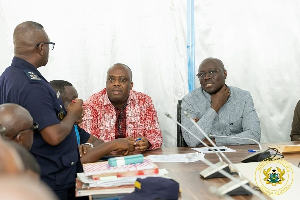Mr. Emmanuel Dei- Tumi, Executive President, Foundation for Future Leaders International, has said the diversity of needs of the youth calls for an integrated approach to reducing youth unemployment.
He said a significant number of young people were either unemployed or under-employed and as long as levels of education were low and youth unemployment was still very high, the better future for the country would not be realized.
“A large percent of them would not be able to create the kind of future we desire for them, if youth unemployed continue to remain as high as it is”, he added.
Mr. Dei-Tumi made this observation at the opening of a two-day conference organised by the Foundation for Future Leaders International (FFLI) in collaboration with the United Nations Economic Commission for Africa, to discuss ways of solving the unemployment situation among the youth in the country.
He said the conference would offer tremendous opportunities for participants to examine what had not worked leading to the still high unemployment, and also learn from what has worked in other countries and customize on them for the country.
Mr. Dei-Tumi said the future of every country was locked up in the youth and so the future of the sub-region lay in over 200 million young people in the sub-region, saying “when a group forms the majority of a nations population, the nation could not develop if it ignored the needs and aspirations of the group.”
He said youth employment and empowerment through increase in access to basic education or literacy level was not enough, and to be competitive in the current milieu, the youth would need more than the ability to read and write, but they need to acquire competencies and attitudes that would make them highly competitive.
He said the conference would also explore the role of the private sector in the implementation of youth policy frameworks and strategies.
Mr. James Jonah, Senior Fellow of the Ralph Bunche Institute for International Studies, said the issue of unemployment was not a problem only in Africa but international and it was important for African governments to start paying attention to this long-standing issue.
He said African government need to create proper environments for enterprises to practice their activities, saying government has the role to create infrastructure for entrepreneurs to invest.
Mr. Jonah said the creation of jobs was not an easy task and the teaming unemployed youth must begin to have a change of mindset in order to be able to survive in the changing and rapidly growing economy.
He said Africa has the opportunity to learn from what was happening in the industrialized world to tackle the massive unemployment on the continent, adding that the private sector need to partner government in ensuring that the problem was solved.
Mr. Joseph Atta-Mensah, Director, Strategic Planning and Programme Management, said that the ultimate successful transformation of Africa depends largely on how we utilize the energies, skills and talents of the youth.
He said, “the main obstacle to converting current growth to structural transformation was if we fail to use the advantages of Africa’s youth bulge in this process, for we require human capital to power our economic progress in the coming years”.
The youth can also make potential contribution to socio-economic development in both Africa and the world, but the truth was that African government were not fully utilizing these precious resources and Africa’s youth continue to struggle to find employment.
Mr. Atta-Mensah said it was an essential need to invest in the African youth’s education, health, promote political stabilities and mainstream youth policies into national development plans and programmes.
He said “it is important for a well structured and carefully calibrated consultative forums that would enable Africa’s youth to convey their aspirations, allow the private sector to indicate its human resource needs and guide strategic government interventions in the labour market”
Mr. Atta-Mensah called for all stakeholders including the organizer to continue to work hard in order to achieve the collective aspirations for a dynamic fully engaged and employed population.**
Regional News of Thursday, 26 July 2012
Source: GNA












